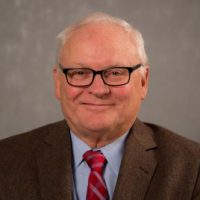AGI News
Europe’s Illusions

Daniel Hamilton
Johns Hopkins SAIS
Daniel S. Hamilton is the Austrian Marshall Plan Foundation Distinguished Fellow and Director of the Global Europe Program at the Wilson Center. He is a widely-recognized expert on U.S. foreign policy and on European, Eurasian and transatlantic security, economic and political affairs. He is quoted frequently in major U.S., European and global media and has testified on numerous occasions before committees of the U.S. Congress and European parliaments.
He is also Senior Fellow at the Foreign Policy Institute of Johns Hopkins SAIS, where he co-leads the School’s postdoctoral program on “The United States, Europe, and World Order.” He was the Founding Director of the SAIS Center for Transatlantic Relations, and for fifteen years served concurrently as Executive Director of the American Consortium for European Union Studies. He has also taught at the Free University of Berlin, the University of Innsbruck, and the Hertie School of Governance.

Jackson Janes
President Emeritus of AGI
Jackson Janes is the President Emeritus of the American-German Institute in Washington, DC, where he has been affiliated since 1989.
Dr. Janes has been engaged in German-American affairs in numerous capacities over many years. He has studied and taught in German universities in Freiburg, Giessen and Tübingen. He was the Director of the German-American Institute in Tübingen (1977-1980) and then directed the European office of The German Marshall Fund of the United States in Bonn (1980-1985). Before joining AICGS, he served as Director of Program Development at the University Center for International Studies at the University of Pittsburgh (1986-1988). He was also Chair of the German Speaking Areas in Europe Program at the Foreign Service Institute in Washington, DC, from 1999-2000 and is Honorary President of the International Association for the Study of German Politics .
Dr. Janes is a member of the Council on Foreign Relations, the International Institute for Strategic Studies, the Atlantic Council of the United States, and American Purpose. He serves on the advisory boards of the Berlin office of the American Jewish Committee, and the Beirat der Zeitschrift für Außen- und Sicherheitspolitik (ZfAS). He serves on the Selection Committee for the Bundeskanzler Fellowships for the Alexander von Humboldt Foundation.
Dr. Janes has lectured throughout Europe and the United States and has published extensively on issues dealing with Germany, German-American relations, and transatlantic affairs. In addition to regular commentary given to European and American news radio, he has appeared on CBS, CNN, C-SPAN, PBS, CBC, and is a frequent commentator on German television. Dr. Janes is listed in Who’s Who in America and Who’s Who in Education.
In 2005, Dr. Janes was awarded the Officer’s Cross of the Order of Merit of the Federal Republic of Germany, Germany’s highest civilian award.
Education:
Ph.D., International Relations, Claremont Graduate School, Claremont, California
M.A., Divinity School, University of Chicago
B.A., Sociology, Colgate University
Expertise:
Transatlantic relations, German-American relations, domestic German politics, German-EU relations, transatlantic affairs.
__

Jeffrey J. Anderson
Georgetown University
Dr. Jeffrey J. Anderson is Graf Goltz Professor and Director of the BMW Center for German and European Studies at the Edmund A. Walsh School of Foreign Service, Georgetown University. He is an expert in European politics, with special emphasis on the European Union and postwar German politics and foreign policy, and author of German Unification and the Union of Europe.
Dr. Jeffrey J. Anderson is Graf Goltz Professor and Director of the BMW Center for German and European Studies at the Edmund A. Walsh School of Foreign Service, Georgetown University. He is an expert in European politics, with special emphasis on the European Union and postwar German politics and foreign policy, and author of . He is the recipient of the 2000 DAAD Prize for Distinguished Scholarship in German Studies, and in 2016 he was awarded the Officer's Cross of the Order of Merit of the Federal Republic of Germany in recognition of his outstanding contributions to German-American and transatlantic exchange in academe and education.

Lily Gardner Feldman
Senior Fellow
Dr. Lily Gardner Feldman is a Senior Fellow at AICGS. She previously served as the Harry & Helen Gray Senior Fellow at AICGS and directed the Institute’s Society, Culture & Politics Program. She has a PhD in Political Science from MIT.
From 1978 until 1991, Dr. Gardner Feldman was a professor of political science (tenured) at Tufts University in Boston. She was also a Research Associate at Harvard University’s Center for European Studies, where she chaired the German Study Group and edited German Politics and Society; and a Research Fellow at Harvard University’s Center for International Affairs, where she chaired the Seminar on the European Community and undertook research in the University Consortium for Research on North America. From 1990 until 1995, Dr. Gardner Feldman was the first Research Director of AICGS and its Co-director in 1995. From 1995 until 1999, she was a Senior Scholar in Residence at the BMW Center for German and European Studies at Georgetown University. She returned to Johns Hopkins University in 1999.
Dr. Gardner Feldman has published widely in the U.S. and Europe on German foreign policy, German-Jewish relations, international reconciliation, non-state entities as foreign policy players, and the EU as an international actor. Her latest publications are: Germany’s Foreign Policy of Reconciliation: From Enmity to Amity, 2014; “Die Bedeutung zivilgesellschaftlicher und staatlicher Institutionen: Zur Vielfalt und Komplexität von Versöhnung,” in Corine Defrance and Ulrich Pfeil, eds., Verständigung und Versöhnung, 2016; and “The Limits and Opportunities of Reconciliation with West Germany During the Cold War: A Comparative Analysis of France, Israel, Poland and Czechoslovakia” in Hideki Kan, ed., The Transformation of the Cold War and the History Problem, 2017 (in Japanese). Her work on Germany’s foreign policy of reconciliation has led to lecture tours in Japan and South Korea.

Peter S. Rashish
Vice President; Director, Geoeconomics Program
Peter S. Rashish, who counts over 30 years of experience counseling corporations, think tanks, foundations, and international organizations on transatlantic trade and economic strategy, is Vice President and Director of the Geoeconomics Program at AICGS. He also writes The Wider Atlantic blog.
Mr. Rashish has served as Vice President for Europe and Eurasia at the U.S. Chamber of Commerce, where he spearheaded the Chamber’s advocacy ahead of the launch of the Transatlantic Trade and Investment Partnership. Previously, Mr. Rashish was a Senior Advisor for Europe at McLarty Associates, Executive Vice President of the European Institute, and a staff member and consultant at the International Energy Agency, the World Bank, UN Trade and Development, the Atlantic Council, the Bertelsmann Foundation, and the German Marshall Fund.
Mr. Rashish has testified before the House Financial Services Subcommittee on International Monetary Policy and Trade and the House Foreign Affairs Subcommittee on Europe and Eurasia and has advised three U.S. presidential campaigns. He has been a featured speaker at the Munich Security Conference, the Aspen Ideas Festival, and the European Forum Alpbach and is a member of the Board of Directors of the Jean Monnet Institute in Paris and a Senior Advisor to the European Policy Centre in Brussels. His commentaries have been published in The New York Times, the Financial Times, The Wall Street Journal, Foreign Policy, and The National Interest, and he has appeared on PBS, CNBC, CNN, NPR, and the BBC.
He earned a BA from Harvard College and an MPhil in international relations from Oxford University. He speaks French, German, Italian, and Spanish.

Stephen F. Szabo
Senior Fellow
Dr. Stephen F. Szabo is a Senior Fellow at AICGS, where he focuses on German foreign and security policies and the new German role in Europe and beyond. Until 2017, he was the Executive Director of the Transatlantic Academy, a Washington, DC, based forum for research and dialogue between scholars, policy experts, and authors from both sides of the Atlantic. Prior to joining the German Marshall Fund in 2007, Dr. Szabo was Interim Dean and Associate Dean for Academic Affairs and taught European Studies at The Paul H. Nitze School of Advanced International Studies, Johns Hopkins University. He served as Professor of National Security Affairs at the National War College, National Defense University (1982-1990). He received his PhD in Political Science from Georgetown University and has been a fellow with the Alexander von Humboldt Stiftung, the Woodrow Wilson International Center for Scholars, and the American Academy in Berlin, as well as serving as Research Director at AICGS. In addition to SAIS, he has taught at the Hertie School of Governance, Georgetown University, George Washington University, and the University of Virginia. He has published widely on European and German politics and foreign policies, including. The Successor Generation: International Perspectives of Postwar Europeans, The Diplomacy of German Unification, Parting Ways: The Crisis in the German-American Relationship, and Germany, Russia and the Rise of Geo-Economics.
This article appeared in Die Zeit on October 31, 2017, and is available in German.
Although for more than 70 years common values were invoked to keep the transatlantic partnership together, now is the time to assert shared U.S.-German interests. For this reason, we, the signatories, take issue with the recent argument offered by Jörg Lau and Bernd Ulrich in DIE ZEIT (“Something New in the West”, ZEIT 43/17) which argues in effect for a German led decoupling of the West from the United States. We are not making a sentimental case for transatlanticism; rather we assert that we have shared interests.
While Lau and Ulrich contend that the U.S. has been receding in its strategic commitment to Europe before Donald Trump took office, Germany remains without question the most important European nation for American foreign policy. The U.S. cannot ignore the strategic importance of a country which has the largest economy and, with the looming exit of the UK from the European Union, whose political weight will only increase. Germany is the sixth largest export destination for U.S. manufactured goods, and at $255 billion German investment in the United States is more than double U.S. investment in Germany. As the Obama Administration recognized, Germany remains key to a coordinated western policy on Russia and has been the driving force on the Russia sanctions policy within the EU and of the Minsk accord on Ukraine. It was this rather than a strategic disengagement from Europe which prompted the Obama team to defer leadership to Germany.
In addition Germany has the deepest and most important relationship with China of any European country, a factor which will only increase in significance in the future of American policy.
The German-American relationship is fundamental to the values and interests of the Western liberal order. The Trump Presidency is ambivalent at best about that order. But in contrast to how Lau and Ulrich argue, Trump is not America and perhaps does not even speak for his own administration on the vital issues of foreign policy. The so called “adults” in the Administration remain committed to the Atlantic alliance and to the U.S. commitment to NATO.
Donald Trump also has German roots
While Trump is sui generis in many ways, he has picked up on a number of trends and policy concerns that Presidents before had too, especially in the area of defense burden sharing and aspects of German economic policy. Yet Trump is quite alone on the issue of the American security guarantee to Europe via NATO, on resolve to counter Russian attempts to undermine the European security order and on the need for a broad alliance and a multilateral approach to the world. Finally, and most important, the U.S.-German relationship has a broad and deep base in civil society including in the private sector, academia and the broader cultural relationship. Over 50 million Americans (17% of the total U.S. population) still can trace their heritage back to German roots (including Donald Trump). This means, as the German statement rightly points out, that the relationship goes well beyond the White House to the Congress and to the state and local levels, key factors which Lau and Ulrich ignore. These institutionalized civil society connections provide stability and predictability in a time of uncertainty in German-American relations and should be reinvigorated.
Germany must continue to build up its defense capabilities and to take on a role in European defense to match its growing economic and political weight. As Lau and Ulrich note, it is clearly the time for Europe and Germany to grow up. Calls during the German election campaign against increased defense spending on the grounds it would mean giving in to pressure from Donald Trump are completely baseless and miss the key strategic challenges facing Germany. There is a widespread consensus in the United States that the U.S. is over-stretched in its defense commitments and that Europeans, in particular, need to do more in this arena. But if Germany takes on a larger role both within NATO and within the EU on security cooperation, these commitments will not be called into question. Given its vast budget surplus, Germany should take immediate and substantial measures to modernize its military capabilities and its defense industrial base.
Let’s be clear: the main challenge on the trade-policy front comes from China and its state-capitalist economic model. In this regard, Obama’s dictum—”If we don’t set the rules, China will”—still holds. But neither Germany nor even the EU alone has enough muscle to oblige China to play by Western rules based on openness and the rule of law. Had it been successfully carried through, the Transatlantic Trade and Investment Partnership (TTIP) between the United States and the European Union would have accomplished this objective—but here the problem was not that the U.S. turned away from the liberal economic order but rather that Germany did, with its misguided fixation on the imaginary evils of American capitalism instead of the very real ones coming from China.
There is no post American West but a post liberal West
On the issue of intellectual property that Lau and Ulrich mention—as well as China’s Non-Market Economy Status in the WTO, investment screening, trade defense instruments, and the role of state-owned enterprises in the global economy—Germany would find a like-minded opposite number in the Trump Administration, whose Trade Representative, Robert Lighthizer, has more than once spoken favorably of the European Union as a partner for the U.S. in creating a fairer international trading system. While TTIP—even with new content and under a new name—should not be relaunched while the NAFTA negotiations are still ongoing, Germans and Americans would both benefit from keeping engaged on this positive common trade agenda.
In addition to the areas addressed above, following the German election there is more room for cooperation on the refugee issue. Lau and Ulrich do not even mention the recent German election and the rise of AfD and anti-refugee sentiment in Germany. The new German government is likely to be much tougher on these issues as the agreement on limiting refugees between the CSU and CDU indicates. Germany is now in a weaker position to lecture the Trump Administration on border controls and opportunities do exist to cooperate on human trafficking and on limiting refugees.
These should be combined with efforts to increase assistance to regions which are producing massive refugee flows. The Lau-Ulrich article paints a stark picture of an America of growing inequality and racism while ignoring similar trends in Germany. The fabric of society is fraying on both sides of the Atlantic. How we come to terms with social change—which comes as a result of the movement of people as well as factors such as rapid digitalization and the changing nature of work—will define how we as societies continue to thrive and grow. Here, too, Germany and the United States can benefit from greater collaboration.
There is no post American West, there is an unfortunately post liberal West which includes more of Europe than they concede.
Jackson Janes
President, American-German Institute
Peter S. Rashish
Senior Fellow and Director, Geoeconomics Program, American-German Institute
Stephen F. Szabo
Senior Fellow, American-German Institute
Lily Gardner Feldman
Harry & Helen Gray Senior Fellow and Director, Society, Culture & Politics Program, American-German Institute
Daniel Hamilton
Executive Director, Johns Hopkins University SAIS, Center for Transatlantic Relations
Steven Sokol
President, American Council on Germany
Jeffery Anderson
Director, BMW Center for German and European Studies, Georgetown University








